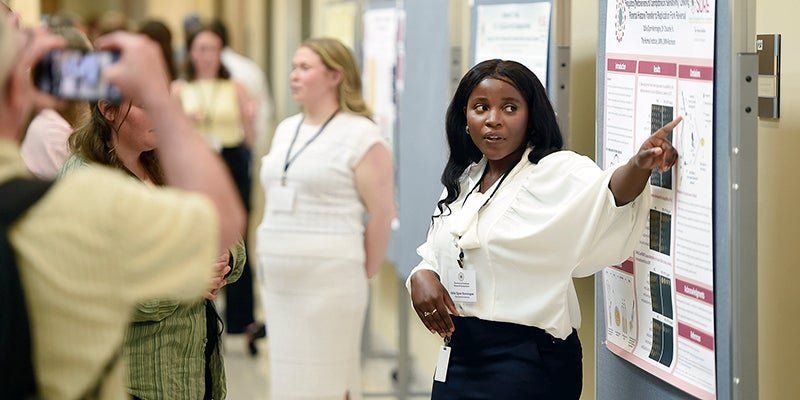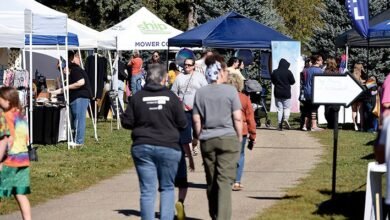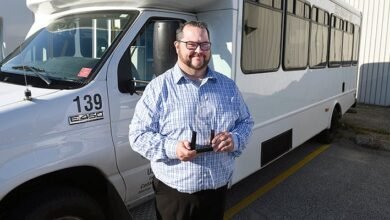Dedication to scientific collaboration and knowledge
Published 4:32 pm Friday, August 1, 2025
1 of 5
Hormel Institute hosts SURE Intern Research Symposium
To close out the month of July, the Hormel Institute, University of Minnesota, hosted a symposium for this summer’s batch of SURE interns.
Established in 1977, the Summer Undergraduate Research Experience (SURE) internship program is a nationally recognized 10-week summer program for undergraduate students that takes place at The Hormel Institute. These undergraduate students gain first-hand experience with biomedical research practices and equipment, as well as mentorship from world-class scientists, participate in weekly professional development courses, and build connections with fellow interns and researchers to network within the scientific research community.
“I think the key thing is the experience that they get,” said Dr. Robert Clarke, executive director of The Hormel Institute. “Yes, they contribute to the work that we do here which is world-class, so they have the opportunity to work with leading scientists. But they also get to build a community of their own while they’re here. They bring energy and excitement and a sense of naïveté in the way they ask questions that force us to think differently about what we do.”
A competitive program that sees many undergrad applications a year, students are selected based on their high level of academic achievement, recommendations from academic leaders, college majors, and plans to pursue careers in science-related fields.
Undergraduates going into their junior or senior year of college are preferred.
“We’re looking for people that we think will enjoy the program, contribute to the program, and work well with each other and within the Institute,” Clarke said. “We want people that fit that mold. We want them to go away having learned and experienced something they will never forget. We want it to be a positive experience.”
The Hormel Institute Research Symposium was a day well spent. It served as a platform for researchers to showcase their work and discoveries. The symposium also included a career development component featuring career panels, poster sessions, and a 40-minute SURE Intern Flash Talk, where each intern gave a two-minute presentation on their research poster.
Dr. Eric Rahrmann, assistant professor and scientific advisor for Microscopy and Histology, is one of the creators and coaches of The Hormel Institute’s Postdoctoral Development Program.
“We’ve created this program to enhance the training that our postdoc’s get,” he said. “They get their hands-on training in the laboratories with their mentors, but there are other aspects of training that go beyond just what they do at the bench.”
Rahrmann and others that lead the postdoc program work to teach communication, presentation of oneself and their work to an audience, and additionally where postdocs want to go next in their career.
“Career development is a life-long process,” Rahrmann said. “We challenge them with continuing to think about what the next steps are, and how they can get from point A to B. The point of this is how can we support them so they can find the paths they want to be on.”
Rahrmann added that most of the themes within the postdoc program trickle down to what is taught to the SURE Interns.
“In my lab, we have one postdoc, one very senior research associate postdoc, and two SURE Interns,” he said. “In that we’ve practiced how to give a talk, how to think about scientific experiments. This gives opportunities for postdocs to develop their leadership skills by matching them up with the SURE Interns. The SURE program compliments postdoc mentorship opportunities.”
Through the SURE intern poster session, each undergraduate was granted the opportunity to discuss the research they had participated in over the summer.
Meer Mohammed and Celeste Remolina are two SURE Interns that will carry this experience with them well into the future.
“In college, everything is so organized,” Mohammed said. “Our research is protocols that are already pre-written for us. What I found here in the research lab is that it rarely works out that way. You’ll continuously encounter failures and know how to navigate those and troubleshoot. Being able to think abstractly and being flexible is something I will carry with me as a researcher and scientist.”
“I learned a lot about thinking critically,” Remolina said. “I learned a lot of experimental design and how to use different techniques to get the results that we want. I also learned how to communicate scientifically, which is something that you don’t usually get in college.”
Remolina stated how there was a slight learning curve at the beginning of the 10-week program but quickly found her footing.
“The fact that we are undergraduates and this is complex research, it was sometimes hard to understand the literature because we learned it from scratch,” she said. “But after going through that, we used what our mentors gave us to keep going with the research and take it somewhere we knew we would have results.”
Director of Community Outreach and Education, Kelly Vincelette, stated how gratifying it was to see each intern’s research and hard work pay off.
“It almost gives me goosebumps because from day one we get to spend time with them and see all the interns come out of their shell,” she said. “We get to see them go on stage and explain their projects and really homing in on those skills that they’ve learned. It’s just amazing and they’re so intelligent. I’m impressed every time I talk to them.”
Source link









